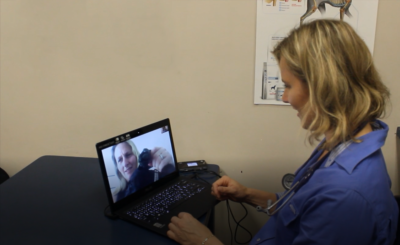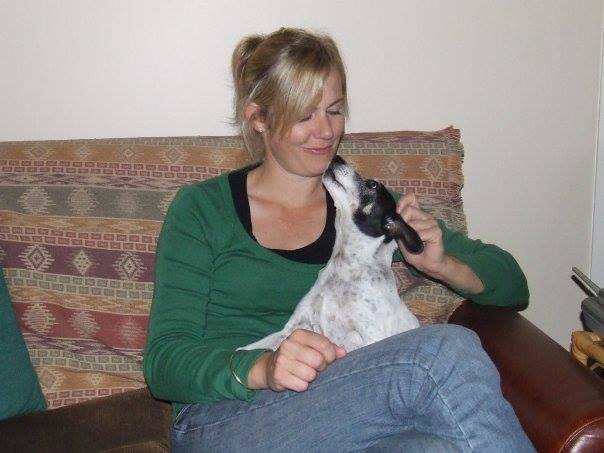How To Know When To Call The Vet?
[easy-social-share]
Sometimes it can be difficult to know when to call the vet for their advice verse waiting and monitoring your pet or horse for a bit longer.
In reality, if you are thinking about and perhaps asking others this question, then really you do need to be talking to a vet because it’s obvious that you have a concern and are worried.
And yes, I know, I know….vets can be expensive and it might be just something little and maybe it’s insignificant. But…..what if it’s not?
What if your powers of observation are spot-on?
You know your pets and horses best.
You are the expert on their behaviour.
Your gut feeling is telling you that you are worried and that there is something wrong.
In this article, Dr Leigh shares her story about her own dog and how she needed to listen to her gut instinct.

Dr Leigh providing an online consult to a client whose dog has a problem with a paw.
When My Gut Feeling was Right: My Dog Pippa, Her Story
Let me tell you a story about my dog Pippa.
Being a vet’s dog, she was always being poked and prodded and used as a guinea pig for xrays/ultrasounds, you name it, poor ol’ Pippa probably had it.
I think I knew the presence of every wart, lump, bump, scratch.
I knew her routines, her sniffles, and every idiosyncrasy.
I bet some of you are the same with your pets and horses.
Pippa had these lumps in her mammary glands.
There were two, both in the last gland on her right side near her pelvis.
I ultrasound scanned her mammary glands.
I wanted to determine exactly what they were and to take samples if required.
Relief.
They turned out to be cysts.
Absolutely nothing to worry about.
I could leave them, watch, see if they grew and became a problem, or I could have them surgically removed. (Now I don’t do any surgery on my own pets….it’s a bit too close to home for me).
I decided to adopt the wait-and-see approach. That’s completely reasonable and there is absolutely no harm in doing that.
What To Do When You Know Something Isn’t Right
About 6 months later, I got a feeling that Pippa was just slowing down a little.
She was eating fine, still active, but just, different.
I palpated her submandibular lymph nodes, the one’s under her jaw. I was sure they felt bigger.
I asked my fellow vet friends to have a feel, to examine her. They were ambivalent….”she’s fine Leigh, stop worrying”.
I just knew something was off.
Being the nervous nana that I am when it comes to my own animals, I decided to get the mammary cysts cut out. I asked the surgeon to remove the local lymph node from the inguinal area and sent it away for histology.
You would never guess.
The lymph node came back as Lymphoma.
I was devastated. This could not be happening to me. Pippa was NEVER sick. She was too young….she was 10 at the time. Her blood tests were all normal. No no no. This just wasn’t fair.
I had caught cancer early.
Pippa went on to have chemotherapy and survived for another couple of years.
There is a moral to this story is:
You know your animals, if you are worried talk to your vet.
Please don’t search for answers on Google or on Facebook forums….that is just generalised advice.
You want to talk to someone who is listening to YOUR situation and has the knowledge to put YOUR puzzle together.
Stay vigilant.
Keep a diary.
This is why I started Your Vet Online.
To give you another option when you have those nagging questions, worries, and doubts.
We are available 24 7, 365 days for you. No more wondering where a “vet near me” is!
If you are concerned about your pet or horse, talk to a vet NOT Dr Google
When To Go Straight To A Vet (all animals)
Our article on types of emergencies you need to seek immediate vet advice for covers the situations stated below:
- Severe bleeding or bleeding that doesn’t stop within five minutes
- Choking, difficulty breathing or nonstop coughing and gagging
- Bleeding from nose, mouth, rectum, coughing up blood, or blood in urine
- Inability to urinate or pass faeces, or obvious pain associated with urinating or passing faeces
- Injuries to your pet/horse’s eye(s)
- You suspect or know your pet/horse has eaten something poisonous (chocolate, rat bait, slug poison, monensin etc.)
- Seizures and/or staggering
- Fractured bones, severe lameness or inability to move leg(s)
- Obvious signs of pain or extreme anxiety
- Heat stress or heatstroke
- Severe vomiting or diarrhoea – more than four episodes in a 24-hour period, or either of these combined with obvious illness or any of the other problems listed here, or if blood is present
- Refusal to drink for 24 hours or more
- Unconsciousness
- Signs of abdominal bloating, with or without increased salivation, regurgitation
Have you had a problem with your pet or horse that you couldn’t pinpoint, yet your vet found with further testing? Tell us all about it in the comments below.
If you would like to discuss a problem with one of the Your Vet Online veterinarians we are available for a consult right now.






Leave A Comment